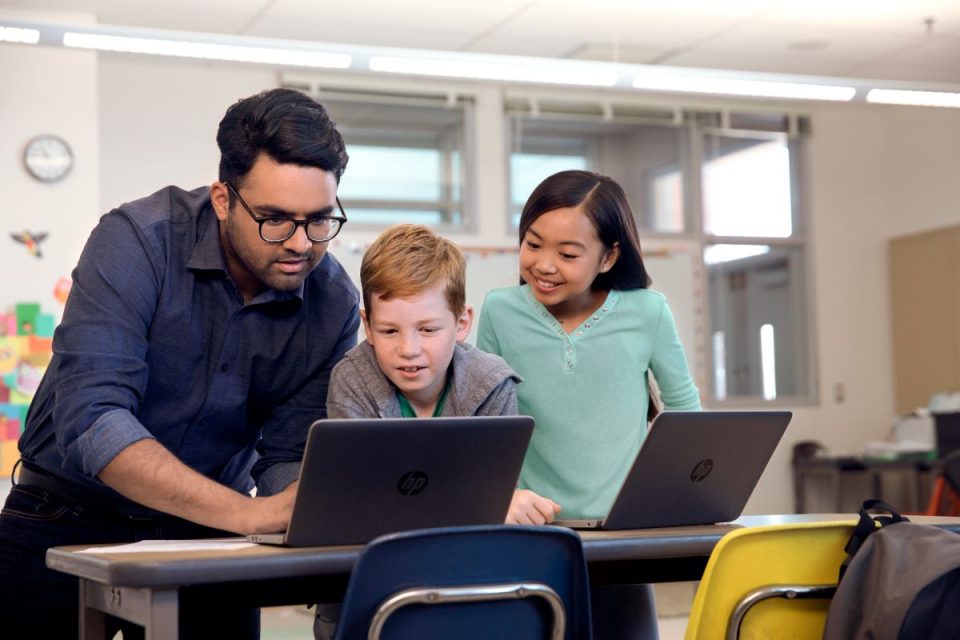Schools play a significant role in society today. It is hard to find a more challenging task than theirs – to prepare children to become productive members of the community someday. Schools are there to teach them to develop skills like critical thinking, socializing, and empathy to prepare them for adult life. Over the last few years, schools have gone through a significant transformation of schools, and there has been a change in educational approach and tools. To find out how schooling changed, we talked with Julia Christova, an HR professional experienced in co-curricular and career consulting. She is passionate about talent innovation, learning, and strong people-centricity. She works in one of the most innovative educational institutions in Bulgaria, St. George International School and Preschool. We talked about new digital trends the school embraced, the implementation of technology innovations in its system, and how much mentorship programs are essential for students’ professional development.
 Every generation is in a way changing the educational system. What are the main changes you have observed as an educator in the last few years?
Every generation is in a way changing the educational system. What are the main changes you have observed as an educator in the last few years?
The biggest and most significant change that we have seen as teachers over the past two or so years has obviously been the need to switch to online learning and how to adapt to it in a very short time frame. When the lockdown was first introduced, we were given less than 24 hours to adapt from face-to-face tutoring to online learning. We sometimes had to be very creative about how new topics were introduced, reinforced, and consolidated. In the same way that teachers had to adapt, so did the software we were using, as the needs of the learners were identified, and the software needed to adjust accordingly.
How is St. George School adapting to this new trend?
There has also been a lot of collaboration amongst staff from different international schools drawing on their own experiences and sharing that information amongst the staff here. For example, tips and tricks for Microsoft Teams and things to look out for and avoid. At St. George International School and Preschool, we use a variety of tools and mechanisms to keep on track. In the online environment, for example, students can communicate with their teachers through Microsoft Teams channels, receive and complete assignments, and collaborate with their classmates in virtual classrooms. It gives educators the power to unlock creativity, promote teamwork, and teach virtually.
Technology plays an important role in our everyday life – how to use the benefits of tech in education and learning approach?
As the world changes, so do the methods we use to educate students. It’s no secret that technological developments have been coming at a rapid pace in the past few decades. The COVID – 19 pandemic is a quick demonstration of why online learning and digital resources should be vital in teaching and learning. We can use the benefits of technology not only in crisis situations but as a part of our teaching process. As advances in technology drive globalization and digital transformation, teachers can help students acquire the necessary skills to succeed in the careers of the future. By integrating technology into existing curricula, schools can harness online learning as a powerful educational tool. St. George International School and Preschool supports the idea of providing a more engaging learning environment. The advantages of technology continue to evolve, and there are many positive developments of technology in St. George’s classrooms.
One of the tools that gives students a practical experience to be more ready for future jobs are Mentorship programs. What is the feedback from students? What do they value the most in these sessions?
What I often hear from our students after completing a Mentorship program is that it changed their life in a very positive and optimistic way. Earlier this month, we had a chance to welcome Microsoft Bulgaria Mentorship Program into St. George International School and Preschool classrooms. Students are often not sure what exactly they want to do after graduating from school, and they need to receive a piece of advice from an adult. Therefore, together with Microsoft Bulgaria, we offered them workshops where they could hear valuable information about the company’s history, mission, and culture, as well as the latest trends in technology. Kalin Dimchev, Country Manager of Microsoft Bulgaria, inspired the young by speaking about his personal experience in the company, his career, and responsibilities within the corporation, as well as how important learning, up-skilling, and certification are for individual professional growth. Students had an opportunity to learn about the future of digitalization, skilling, and business and meet with Microsoft partners and clients here in our school. That helped them discover their interests in STEM and further explore education options to pursue a career in ICT. Mentorship programs give this practical exposure to students, and they feel better prepared for the choices they are going to undertake. If you step into the shoes of the professional you would like to become one day, you will become much more aware of what to expect and whether this really is the job you feel comfortable with. If your internal voice says “Yes!”, then go for it and give your best.
When we talk about jobs of the future, what do you think they will be? And what are the steps that every student can take today to be ready?
Streamlining repetitive processes with automation allows for a greater focus on the need for data management, analysis, and more attention to social interactions. Working globally is becoming a norm, with technology negating the need for on-site presence, allowing anyone to work from any place, anywhere. Despite that, people have evolved their understanding of what is considered a possible job opportunity. For quite some time now, it has been a regular occurrence for people to switch cities and even countries or continents for a job. At St. George, we believe that for a student to be ready for the future, they must learn to adapt to an ever-changing or new environment, be it because of their evolving “job” or of their own desire to explore new places. We try to provide our students with more than just knowledge. We want to give them the skills necessary to compete in this ever-growing environment by being up to date with some of the more conventional technological tools present in most working environments. Handling technological and social aspects of future jobs will be a must for students, but even with the constant changes, some skills will remain constant. Skills that can be developed from an early age include planning, prioritizing, compartmentalizing, and evaluating the tasks ahead and their own ability.
What is the role of the educational sector and the government in creating 21st-century learners? What about the private sector? How can we contribute?
The educational sector has always been a vital element in children’s life where they not only develop skills, acquire knowledge, and learn about the world around them but they adapt to the changes and create a future vision for the world. In the 21st century, it is crucial to notice the increasing need for more accessible information and the development of technology which should be implemented in all spheres of life. Learners nowadays must be provided with easy access to various educational materials. They should feel comfortable enough to expand their vision and be prepared for their future academic path. The private sector in education has an important mission to provide students with a smooth transition through every stage and to give them much more than the basic educational structure. We are dedicated to the future development of each child as it is our primary goal to inspire students with knowledge and skills to realize their potential in a global community. Speaking about practical experience, we value corporate initiatives like Microsoft’s Mentorship Program, as they give our students valuable insight into real-life business and help them decide which career to pursue.
Do you see the role of educators/professors changing in the future? How to stay agile in a changing environment?
Most certainly, educators will be required to be up-to-date, especially with curriculum and technological developments, and to refine and update their soft skills. Although technology offers access to a world of information, it carries some risks for potential social alienation and withdrawal. This is where teachers will play a crucial role in helping students navigate real-life problems, complex social interactions, and social problem-solving. As I previously stated, teachers are not always the first to get on board with new ideas if they are not allowed to see their benefits. We did not have that opportunity with the lockdown and had no choice but to get on with things for the benefit of our students. I can easily see the major role of educators in the future because our own personality, who we actually are, is probably the only thing that cannot be replaced by technology.





